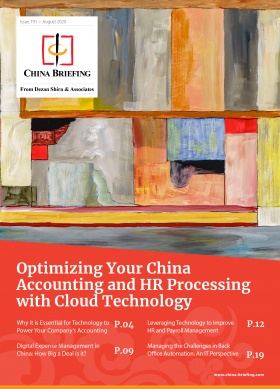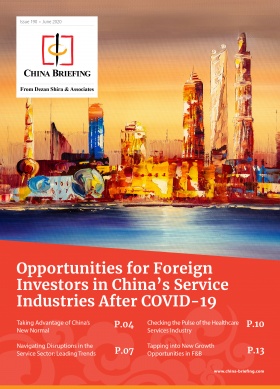What Do EU Investors Seek from China?
China is a major recipient of foreign investment, including from the European Union (EU). However, from the EU perspective, foreign investors do not get the same treatment in the Chinese market and by regulatory authorities when compared with domestic companies. EU investors believe that their companies often deal with a non-transparent, inconsistent, and unpredictable set of rules that do not make it easy to do business in China. Given this perception, the EU has repeatedly asked China to open its market; in other words, to relax the non-tariff barriers and provide assurances that European companies would be subject to the same levels of transparency and fair competition as those enjoyed by Chinese companies in the EU market.
Meanwhile, China appears to be seriously moving to meet these criticisms halfway. Beijing has initiated some important reforms, though from the EU’s point of view, there is still some way to go, particularly in matters such as the protection of European intellectual property rights and unfettered access to the Chinese market. The Comprehensive Agreement on Investment (CAI), if it gets confirmed, will be a key tool to address this lack of balance.
Foreign investment in China by data
Despite the complexity of the Chinese market, the vagueness of its legal frameworks, and the disparities between foreign and domestic enterprises, the World Investment Report 2019 published by the United Nations Conference on Trade and Development (UNCTAD) noted that China remains the world’s second largest foreign direct investment recipient after the United States, followed by Hong Kong.
Indeed over 40,000 new foreign-invested enterprises were established in China in 2019, while the number of foreign-funded projects with investment of at least US$100 million in the country reached 834. In 2020, the trend remains strong as investments carried out by European companies – mainly from Germany, Netherlands, and France – in China amounted to approximately US$2.3 billion in the second quarter of the year.
Major recipients of foreign investment have been the automotive industry, followed by basic materials and food and agriculture. With reference to foreign investors, it is worth noting that the majority of EU investments have been made by private companies investing in their core business activities. In contrast, it appears that most of the Chinese companies investing in the EU are state-owned enterprises (“SOEs”).
Interestingly, according to the China Business Confidence Survey 2020 published by the European Union Chamber of Commerce, if greater Chinese market access were to be granted – 62 percent of the members of the European Chambers would be more likely to increase their investment in China.
China’s latest reforms on foreign investment regulation
Foreign investors in China face many difficulties due to restrictions (or prohibitions) on investing in certain industries or services sectors, in addition to the relevant bureaucratic procedures that regulate such investment flow – for example, special licenses, registrations, approval procedures, standards achievements, and/or certifications. On the top of this, foreign investors may find it difficult to interpret the laws and policies regulating their market entry and businesses, which is often considered more favorable towards local enterprises.
Nevertheless, China is keen to improve its business environment and has, in the last few years, embarked upon a series of reforms to address these constantly reported challenges faced by foreign investors. As a result, the World Bank’s 2020 assessment ranked China 31st out of 190 countries worldwide, based on the ease of doing business parameters, with a score of 77.9 out of 100.
China’s reforms include amendments to simplify and improve several procedures concerning business registration, construction permits, electricity, property registration, credit, minority investors protection, tax payment, cross-borders trading, contracts’ enforcement, and insolvency.
Furthermore, in response to the demand for a more open market ruled by clearer regulations, China enacted the new Foreign Investment Law (“FIL”) in 2019, which came into effect starting January 1, 2020. This was accompanied by the Regulation on the Implementation of the Foreign Investment Law. The FIL replaces existing laws on wholly foreign owned enterprises, Sino-foreign contractual joint ventures, and Sino-foreign equity joint ventures.
The new regulatory regime has partially addressed EU concerns, providing clear legal grounds for more effective protection of foreign investor’s legitimate rights and interests (including better intellectual property rights protection and equal treatment for foreign firms in government procurement). However, the FIL still does not move far enough to create free market conditions that EU investors say is accessed by Chinese firms. In fact, despite some key positive changes, the FIL is vague in its wording and thus likely to be inconsistent during practical enforcement; this underlines the distinction between the experiences borne by foreign and domestic companies in China. Moreover, China still maintains its moderation of market access in select sectors and industries, with its latest list of restricted and prohibited industries under the new Negative List for Foreign Investment (“Negative List”) released on June 24, 2020.
A key EU concern is the power conferred to China’s State Council under the Negative List to approve or deny the application of foreign investments. This discretionary power of the State Council creates uncertainty among foreign investors, who are not able to assess in advance if their application will be approved or rejected by the top authority.
China-EU trade and investment agreement negotiations: Sticking points
In terms of the ongoing bilateral negotiations on trade and investment, some progress was recently made. China and the EU signed a bilateral agreement to protect 100 European geographical indications (“GIs”) in China and 100 Chinese GIs in the EU against usurpation and imitation. Also, negotiations to finalize the Comprehensive Agreement on Investment (“CAI”) is expected to be concluded by the end of this year.
Geographical Indications agreement
The GI agreement, first concluded in November 2019 and effective from 2021, marks an important step in EU-China trade cooperation considering that, when it will come into force, it will bring reciprocal trade benefits and introduce consumers to guaranteed, quality products on both sides.
Indeed, the products mentioned under this agreement are to be considered as characterized by their unique features – linked to their geographical origin and traditional know-how.
It is relevant to mention that an additional list of 175 GIs from both sides will be protected within the four years after the entry into force of the agreement.
Through this bilateral agreement, the EU-China trading relationship is expected to enjoy an additional boost, especially in the food and beverage market, which account for a significant proportion of EU products sold in the Chinese market every year. In fact, in 2019, China was the third top destination for EU agri-food products, reaching €14.5 billion (US$17.022 billion); in the same year, China was also the second most favored destination for EU exports that are identified by their GI specifications, including wines, agri-food products, and spirit drinks.
Comprehensive Agreement on Investment
Through the CAI, the EU aims to create new investment opportunities for European companies by opening China’s market and eliminating discriminatory laws and practices that prevent them from competing in the Chinese market on an equal basis with Chinese companies and companies from third countries.
The fact that it is still under negotiation indicates that the China-EU relationship still has some work to do in terms of reaching common ground. If the agreement is signed, it will represent a turning point in their bilateral investment relationship.
What are some of the EU’s pending requests from China?
During the e-summit held on September 14, 2020, EU leaders welcomed the progress achieved on the rules disciplining the behavior of SOEs, on forced technology transfer, and on transparency of subsidies; they, however, underlined the urgency of rebalancing the market and the need for sustainable development.
With reference to investments, the following are the EU’s pending requests towards China, and the conditions under which the EU will sign the CAI:
- Eliminate quantitative restrictions and equity caps or joint venture requirements;
- Provide a truly level playing field between foreign and indigenous investors, ensuring that EU companies compete on an equal footing when operating in China, compared to Chinese and third-country companies;
- Guarantee transparency, predictability, and legal certainty of the investment environment, ensuring that EU companies in China have proper access to information affecting their businesses and the opportunity to comment on relevant laws and regulations;
- Discipline the behavior of SOEs and increase the transparency of subsidies;
- Undertake adequate commitments regarding labor and the environment in order to promote sustainable development;
- Ensure a high level of protection for EU companies, while preserving governments’ right to regulate; and
- Include provisions for dispute settlement (state-to-state) and an institutional framework to monitor its implementation.
In the event China will implement further reforms and thus meet the EU requests, trade and investments between the two regions will inevitably increase in light of legal guarantees, such as transparent regulations and subsidy policies and a level playing field in the market.
China-EU relationship in the global context
It is evident that in the last few years, China and the EU have been able to foster closer ties in trade and investment. Yet, it is their differing political ideologies, economic considerations, and strategic priorities that often slows down the scope of their cooperation.
Beyond the strictly bilateral relationship, their trading and investment behavior is also influenced by other external factors, tied to their global role and relations with other countries and regional alliances. Among other factors, the US-China trade war has certainly played a key role in this regard.
On one hand, China is trying to secure greater cooperation with the EU to balance the negative impact of US protectionism, and, on the other side, the US is also trying to get EU policymakers to isolate whom it views as its rival on the international stage. At present, the EU has trodden a relatively neutral path, focusing instead on issue-based concerns and bilateral resolution – especially as both China and the US are its major trading partners. The EU cannot risk antagonizing either country without suffering considerable socioeconomic blow-back.
Another important aspect of the China-EU relationship is the Belt and Road Initiative (“BRI”), through which the EU will benefit not only from easier trade with China, but also in terms of securing market access in other countries, especially in Central Asia. The perception of this initiative across European countries has changed over the years, from being welcomed to even being viewed as a potential threat to the EU economy.
A common refrain to the risk-averse EU is that the BRI could cultivate an economic and strategic dependency on China. Indeed, many developing countries are indebted to China and it cannot be excluded that the level of their debt can increase in case these countries borrow from China to carry out the construction projects planned under the BRI. If this occurs, it may also be the case that these countries give preferential treatment to Chinese companies, thus affecting the EU enterprises participating in BRI projects.
In conclusion, considering the impact of third-parties’ relationships with China, the EU will have to carefully observe China’s dealings with other countries, with the aim of assessing the consequences that such actions may have on the EU economy and its business stakeholders, and therefore, adjust its responses accordingly.
About Us
China Briefing is written and produced by Dezan Shira & Associates. The practice assists foreign investors into China and has done so since 1992 through offices in Beijing, Tianjin, Dalian, Qingdao, Shanghai, Hangzhou, Ningbo, Suzhou, Guangzhou, Dongguan, Zhongshan, Shenzhen, and Hong Kong. Please contact the firm for assistance in China at china@dezshira.com.
We also maintain offices assisting foreign investors in Vietnam, Indonesia, Singapore, The Philippines, Malaysia, Thailand, United States, and Italy, in addition to our practices in India and Russia and our trade research facilities along the Belt & Road Initiative.
- Previous Article World Bank October 2020 Report Says China Economy to Grow by 7.9% in 2021
- Next Article Taking Advantage of China’s New Normal









